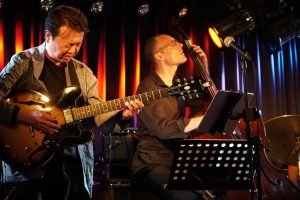Gene "Ess" Shimosato Tokyo Quintet
May 26, 2018
Absolute Blue
Gene “Ess” Shimosato—guitar
David Negrete—alto sax
Raymond McMorrin—tenor sax
Pat Glynn—bass
Gene Jackson—drums
Great pairing of musicians is as important to a great set of jazz as it is to food and wine. Shimosato’s selection of musicians gets right into the dynamics of group interaction from the first note. The evening was full of drive, energy and lovely-sounding complex contemporary jazz. The driving modal intensity of “Into the New World,” the kick-off number, showed how deep his sense of who works well with who. The sleek sound of his guitar set off the grittier saxes with just the right balance.
After loosening up on “I Didn’t Know What Time It Was,” in a great arrangement that moved from slow, pensive soloing to funky territory, the quintet was obviously having a great time. Glynn and Jackson were also a great pairing, plugging the rhythms deep.
By the time the quintet got to McCoy Tyner’s very complex and very well arranged “Contemplation,” everyone were in an intense sync, with more and more intense soloing, listening and responding to each other, complementing and pushing each other. The contemplative sound of the Tyner arrangement worked just right for all the musicians. McMorrin poured out melodicism and Negrete added guts. Glynn soloed on bass with melodicism and rhythm.
Shimosato’s original “Onward and Upward” hopped into a driving fast, tempo-shifting burn that let everyone have their say. Jackson is always a great addition to any group, and on this tune, he really let loose to give back to the other soloists the full energy of his drums. On guitar, it’s not just that Shimosato knows the tune, but rather that his soloing flows out of the inner depths of his experience, feeling and calm virtuosity. [perfectpullquote align="right" bordertop="false" cite="" link="" color="" class="" size=""]his soloing flows out of the inner depths of his experience, feeling and calm virtuosity.[/perfectpullquote]
The second stage was graced with a very lovely arrangement of “Charade.” Shimosato’s intro was fantastic, and the rest of the arrangement was gorgeous and haunting. The quintet balanced a full orchestral feel with deeply felt solos. That often-done song felt new and strong, vibrant in each of the solos. The full-on, broad soundscape the group created fit the song just right.
Wayne Shorter’s “Yes and No” got into a strong groove that really flew. Negrete and McMorrin mixed it up, playing off Shimosato’s guitar with a strong sense of how they each had different, yet connected things to say. That interaction intensified with the last cut, an as-yet untitled original recently written in Osaka. Jackson helped funkify the back-and-forth of the horns and guitar with a deep riff that let the cool takes rise higher and higher.
The evening’s balance of tunes, songs and energy was just right, reaching for the right hard-to-get sounds and finding them again and again, then just laying back and enjoying it all. Shimosato as leader knows how to keep everyone moving forward and digging deeper.



